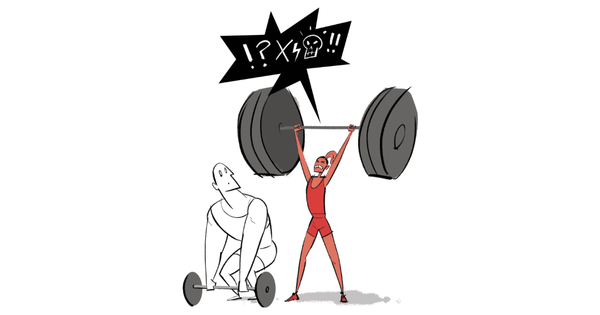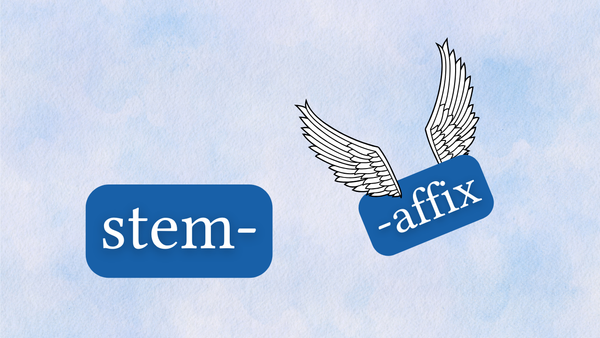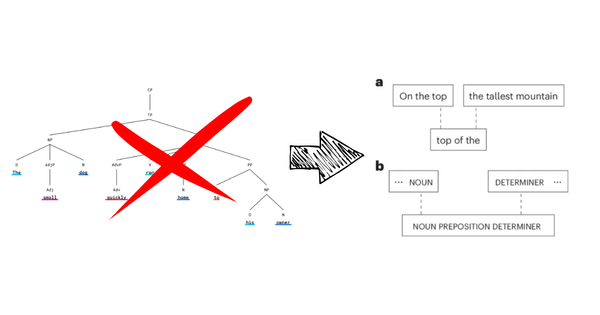“6-7” belongs in the dictionary, actually
In defense of Dictionary.com’s 2025 Word of the Year

When Dictionary.com recently anointed 6-7 as their 2025 Word of the Year, it felt to many like ragebait. The resolution was greeted with furor and frustration by language purists everywhere. “It’s meaningless,” the critics said. “It’s a passing fad.” “It’s not even a word.” But dictionaries are cultural records, not arbiters of lexical correctness. Here’s why 6-7 has earned its place in the dictionary.
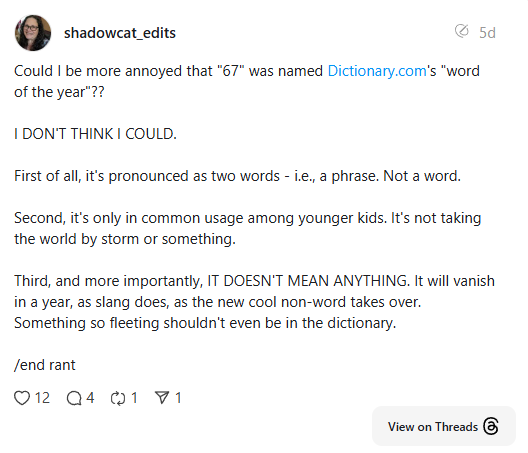
For the not chronically online among you who might not have encountered the expression yet, 6-7 is meant to be nonsensical, playful, and absurd. Like most slang, it’s intentionally obscure and aims to disrupt common social expectations. A well-placed 6-7 is one that comes when it’s least expected.
6-7 is an example of a specific type of slang that has received its own category of late, called brainrot, referring to expressions that arise in “chronically online” communities and are said to be the result of consuming large amounts of low-value internet content.
It’s also one of a fascinating set of expressions where what you do with the word, socially, is more important than what is meant by the word. Ta-da! marks a reveal. Oops acknowledges a mistake. Ugh expresses disgust or frustration. The definitions of these words are the social deed you accomplish in the mere act of uttering them. In the technical jargon of philosophy of language, we’d say that the illocutionary or pragmatic meaning of these words is more prominent than their locutionary or semantic meaning. Although in some contexts 6-7 can mean ‘so-so’ or ‘maybe this, maybe that’ (especially when paired with an alternating hand gesture), its primary meaning is the social function of indicating playfulness, surprisal, and absurdity.
Yet even many of those who appreciate 6-7’s whimsy oppose Dictionary.com’s decision to recognize it, citing objections such as “It’s a passing fad” or “It’s meaningless.” Here are a few of the more common objections and what linguistics—the scientific study of how language works—has to say about them.
“It’s a phrase, not a word.”
Lots of dictionary entries are what are technically called multi-word expressions (MWEs), or compound words. Dictionaries record any MWE whose meaning is more than just the sum of its parts: give up and self-esteem are two examples.
6-7 isn’t structurally different from other hyphenated numeral expressions like to sixty-nine (the sexual act) or to eighty-six (to refuse to serve a customer; to eject or ban). Each of these are MWEs.
“Only kids use it.”
Many words are restricted in their usage or demographics. Only older generations say “That’s swell”, and only people in New England say “Wicked!” as an expression of approval.
Regional words or generational words are still words, even if not everybody uses them.
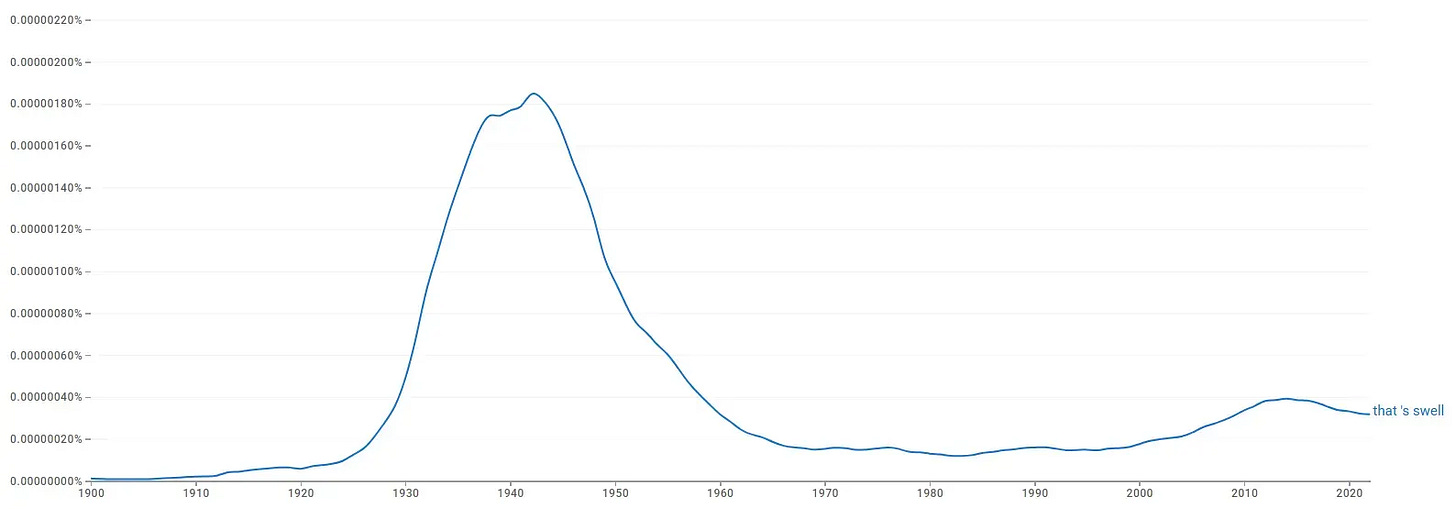
“It’s meaningless.”
No word in common use is truly meaningless. Why would people say something if not to express some kind of meaning? Just because the meaning isn’t obvious (to you) doesn’t imply it’s meaningless.
As discussed above, oftentimes the pragmatic meaning of a word (the contextual/situational meaning) is more important than the semantic (literal) meaning of a word anyway. That’s what’s happening with 6-7: it’s an intentionally absurdist use of otherwise dull words.
“It’s not even a word! It’s just numbers!”
A number is a mathematical object, a concept.
A numeral in linguistics is a word for a number.
6 and 6th are numbers. six and sixth are numerals (cardinal and ordinal numerals specifically).
So to be precise, Dictionary.com’s Word of the Year is the linguistic expression six-seven and not the numbers 6-7.
“It’ll be gone in a year. Dictionaries should only record words likely to stick around.”
It’s true that 6-7 has seen a rapid ascension to lexicographical greatness, from complete obscurity in January to one of the most widely-used and widely-discussed expressions of the year. And precisely because of its recency, Dictionary.com has for now marked the entry as slang and included it in its distinct slang dictionary.
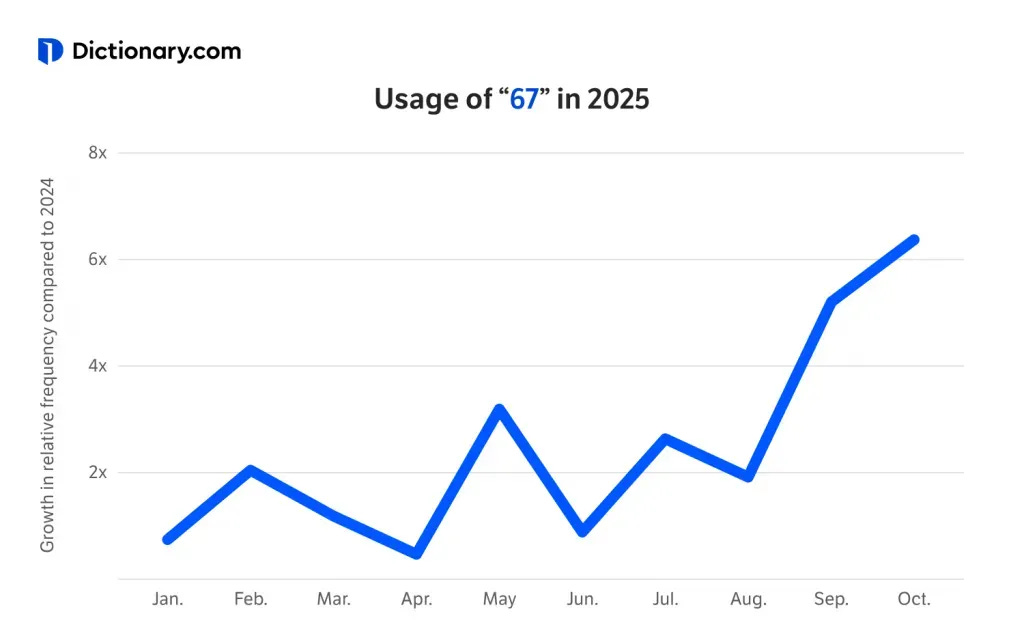
And yes, the vast majority of slang—and words in general!—have short lifespans. But plenty of “real” words that once illuminated our lexicon have now dimmed into obscurity, such as wherefore, thither, and overmorrow. There are over 500,000 words in the OED, but the average native American English speaker only knows about 42,000, meaning that many words have fallen out of use. A century from now, readers will encounter 6-7 in texts from this period and want to know what it meant.
A dictionary’s job is to document all of the words, not just the ones you like. In all likelihood, we’ll have forgotten about 6-7 in a year. But who knows? Perhaps 6-7 will graduate from mere slang to the respected rank of Real Word, and in a hundred years we’ll be grateful to the dictionaries for documenting its whimsical rise to lexicographic legitimacy. Either way, we should appreciate the socially complex and linguistically creative nature of 6-7 and enjoy it while we still can.
If you enjoy this newsletter and want to support Linguistic Discovery’s mission to educate the world about the science and diversity of language, consider becoming a supporter! You’ll get bonus articles and early access to articles and chapters of my book!
📚 Recommended Reading
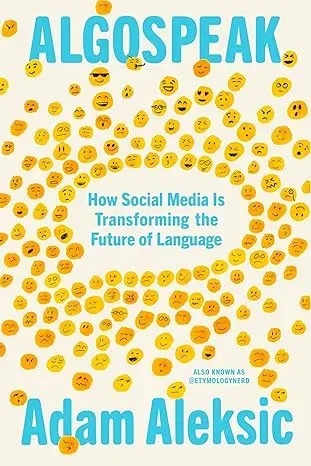
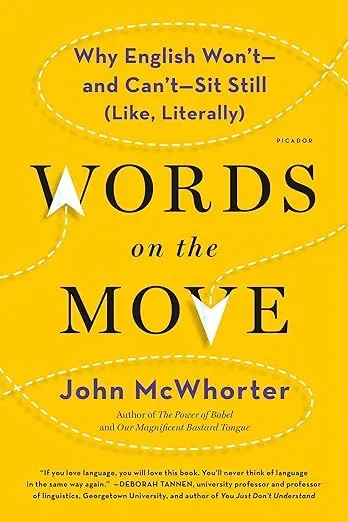
If you’d like to support Linguistic Discovery, purchasing through these links is a great way to do so! I greatly appreciate your support!
Check out my entire Amazon storefront here.

